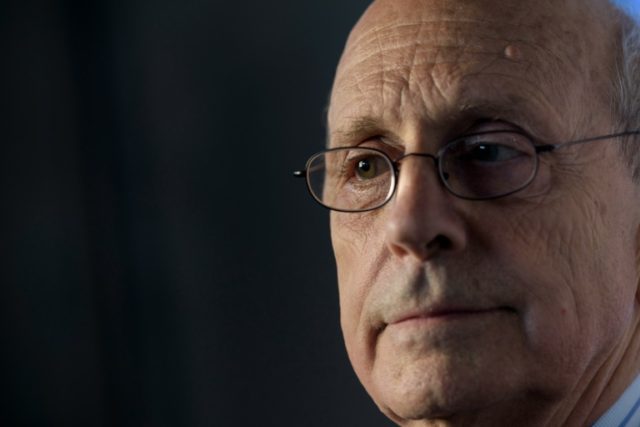Washington (AFP) – Split by an unfilled vacancy and caught in an election year tug-of-war, the US Supreme Court is “functioning” all the same, says Justice Stephen Breyer, one of its liberal-leaning justices.
“We do our job,” Breyer said in an interview with AFP, dismissing the press’s characterization of the highest court in the land as hamstrung and diminished since the death in February of conservative Justice Antonin Scalia.
“I think we’re functioning. We do our job and that’s what I do. Everyone is entitled to an opinion about what we do,” he said.
“What we do is we decide cases, we make up our minds, we write opinions explaining the reason and we release those opinions. When they are released, they are often criticized,” he said.
Simply by virtue of its having the crucial last word on society’s most pressing issues, the Supreme Court has an exalted place in US democracy.
But since Scalia’s sudden death, the court has found itself in the unusual position of being ideologically in balance, with four conservative justices and four liberals.
The absence of a natural tie-breaker has raised the threat of repeated deadlocks, leaving in place lower court decisions on important, politically charged cases.
But no relief is expected this year because a Republican-controlled Congress is determined to deny President Barack Obama the opportunity to reset the court’s balance for years to come by filling the vacancy.
Consequently, Republican leaders have refused to give Merrick Garland, Obama’s pick to replace Scalia, so much as a Senate hearing, much less a confirmation vote.
– Chicken a la king –
Breyer has a good idea of the type of person he would name to the ninth seat, but keeps his opinion to himself.
“I can’t suggest who the president should appoint. It’s not my job. I was not the person who appointed anyone, I was the appointed person. I was not the person who confirmed anyone, I was the person who the Senate confirmed.
“So asking me a question about who should be appointed or how that process works is like asking for the recipe for chicken a la king from the point of view of the chicken,” he said.
Should there be a fourth woman on the court?
“A diverse court is a better court and getting people with different points of view, different experience, different backgrounds,” he said.
“There’s nothing wrong with my saying that. I think that.”
Breyer himself was picked 22 years ago by president Bill Clinton. In the years since, he has become a pillar of the court’s liberal wing, along with the 83-year-old Ruth Bader Ginsburg, known for his arguments against the death penalty.
One reason the choice of a new justice is so consequential is that they serve for life.
Breyer, who is 77, is not opposed in theory to a limited term.
“I think they should be long, terms of 15, 18 years. Because it’s not a good idea to have a judge on our court thinking about what his or her next job will be,” he said.
“So you want a long term, but a long definite term would serve the same purpose as the constitutional provision that in effect says life.”
But, he added, such a change would probably require a constitutional amendment — “and I don’t think that’s a very good idea, because when you start amending constitutions, you don’t know where you will stop.”
“We have very few amendments, 27, and probably it’s good to have that few because it produces a kind of stability,” he said.
Breyer keeps a tiny copy of the constitution in his vest pocket at all times.
Certain amendments, notably the first guaranteeing freedom of expression and religion, the second on the right of the people to keep and bear arms, and the eighth banning cruel and unusual punishment, have been the subject of epic Supreme Court battles.
In a presidential election year marked by the surprise rise of Republican presumptive nominee Donald Trump, many perennial issues have become even more explosive.
– Hot docket –
The weeks ahead promise to get hotter, with the Supreme Court in session until the end of June.
“We have several cases on the death penalty, we have a case on abortion, we don’t have a case on gay marriage but I can’t go into that,” he said.
A native of San Francisco, a connoisseur of Proust and Stendhal, Breyer also likes to quote Cicero — “In times of war, the law falls silent” — in recalling that during World War II, some 70,000 Americans of Japanese descent were unjustifiably interned in camps.
He believes it is unlikely that would occur today, but when asked about the possibility of mass deportations of undocumented immigrants — as Trump has promised to do if elected — he deflected the question.
“You are getting into a political issue here which I have to stay out of,” he said with a smile. “It’s a subject of the political campaign and I can’t get into it.”

COMMENTS
Please let us know if you're having issues with commenting.